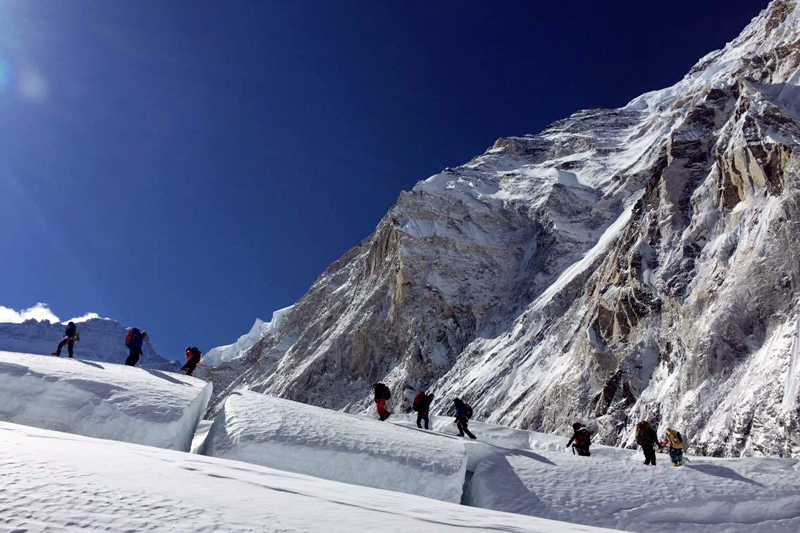Nepal opens for tourism, autumn climbing activities
KATHMANDU: With the government announcing to resume all international and domestic flights from August 17, the Ministry of Culture Tourism and Civil Aviation today said that it would let all tourism related activities including mountain climbing in the autumn season commence.
With the latest announcement, the tourism fraternity believes that the industry which incurred a loss of over 10 billion rupees a month during the COVID-induced nationwide lockdown would gradually return to a new normal.
“The ministry plans to resume all tourism related activities by following health and safety protocols from August 17,” ministry’s secretary Kedar Bahadur Adhikari said, adding that safety protocols are being finalised by holding consultations with stakeholders concerned.
According to the Cabinet decision, flights will be resumed in three phases. In the first phase, flights will be operated to the destinations that are less affected by COVID-19. After that, gradually, flights will be operated to other destinations in the second and third phases. During the initial period of flight resumption, all airline companies will not be allowed to operate all their aircraft at once. Permission to operate aircraft will be given based on the destination and the number of passengers.
“MoCTCA will coordinate with the Ministry of Health and Population for safety of the passengers travelling via commercial flights if any health issue does arise.”
Dr Samir Kumar Adhikari, Joint-Spokesperson at the Ministry of Health and Population, said that the ministry would soon come up with new guidelines on handling of the arriving air passengers after August 17.
“All passengers who plan to arrive here on charter or repatriation flights until August 16 should go to quarantine centres,” Adhikari said, adding that passengers of the scheduled commercial flights must show their PCR report to enter Nepal thereafter.
According to him, the Health Ministry has been discussing with the stakeholders and experts to decide on whether passengers of the scheduled international flights should go for self-quarantine even after producing the PCR test report.
Raj Kumar Chhetri, Spokesperson at the Civil Aviation Authority of Nepal, said that CAAN, Tribhuvan International Airport and respective airlines have also prepared standard operating procedures to resume domestic and international flights.
“CAAN is holding a series of meetings with domestic airlines tomorrow and day after to facilitate operations following health and safety protocols,” he said. Both domestic and international flights will be operated under the 'Guidance to Airlines, Airports and Ground Services for Operations during COVID-19’, he added.
The Department of Tourism is all set to issue climbing permits for the autumn season after the government decided to resume domestic and international flights. “Climbing activities in the autumn season and onwards will go on,” DoT’s Spokesperson Meera Acharya, said.
Talking to THT Online, international expedition operator Lukas Furtenbach, however, pointed out two problems.
He said, firstly, many important source markets including the USA, Europe, South America, Russia, Middle East, some Asian countries are in the middle of the pandemic. "People there are losing their jobs, businesses are going bankrupt, they have concerns about elder family members, and they are afraid of what might happen while they are on expedition." Furtenbach added that people are also concerned about whether there will there be a second wave of infection or new quarantine requirements, which may prevent them from travelling home after the expedition.
"So what I am experiencing with my clients is that they are too concerned and prefer to wait for next year when the worst is over, a vaccine or treatment probably available, and their financial situation clearer. For sure there will be a few people willing to take these risks and we might see some small expeditions in autumn. This too depends on whether or not airline companies fly to Nepal; they will only fly if they sell enough tickets. And that brings me to my other concern."
He pointed out the second hurdle. "What if one person in the expedition team is COVID-19 positive? A regular basecamp setup would be ideal for the virus to spread in the whole team very quickly. Cold temperatures help to spread the virus and the body and immune system are already weakened by the hypoxic environment, exhaustion and cold. I don’t want to contract COVID-19 infection with high fever and a pneumonia when I am high up on the mountain."
Furtenbach concludes that all in all he is not very positive for the autumn season. "As an operator, I see too much risk for my clients and my staff. I prefer to work on medical safety and hygiene protocols and develop a new safe basecamp setup for next spring season so that we can be back on the mountains with our clients but with a plan, a strategy and an idea about how to handle all this. I would not want to take the trial and error method as would be the case now. Because for now, we don’t know enough about this virus."






